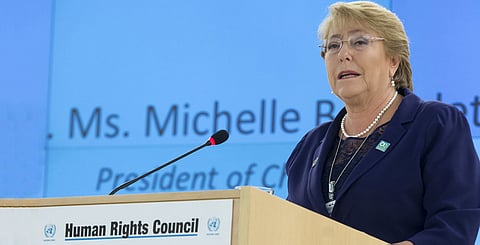

Michelle Bachelet, United Nations (UN) High Commissioner for Human Rights, expressed her dismay at reports indicating increased stigmatization faced by members of minority communities and migrants, which in some cases is by officials. Speaking at the 44th session of the Human Rights Council on human rights and the impact of the COVID-19 pandemic, she said that members of the Muslim minority are being targeted by stigma and hate speech in association with COVID-19 in countries like Sri Lanka and India.
Highlighting the debilitating impact of discrimination on people, she commented "Discrimination kills. Depriving people of their social and economic rights, kills. And these deaths and harms damage all of society. COVID-19 is like a heat-seeking device that exposes, and is fuelled by, systemic failures to uphold human rights".
The U.N. High Commissioner also stated that it is clear that this epidemic threatens both peace and development. She noted the importance of more civil, political, economic, social and cultural rights, and not less. She called upon everyone to adopt strong and transformative measures to heighten the powerful protections that human rights based-policies can provide, by promoting public health, public confidence in official guidance. She called for leadership grounded in clarity, evidence and principle to protect the most vulnerable members of society, and to address the profound inequalities that are accelerating the pandemic's incidence and impact.
The pandemic, she said, is also likely to generate profound and long-lasting impacts on children. Referring to the reports of the United Nations International Children's Fund report (UNICEF), she said that unless we take urgent action to protect families from the economic impacts of the pandemic, the number of children living below national poverty lines could increase by 15 per cent in 2020.
"The World Food Programme estimates that the number of young children suffering acute malnutrition could increase by 10 million this year. Disruption to schools and training programmes heightens the risk of the poorest children falling behind and increases children's exposure to the threat of domestic violence, child labour , child marriage, and female genital mutilation . We are also seeing signs of a surge in online sexual exploitation of children", Michelle Bachelet said.
She closed her address by saying that we must all acknowledge that human rights are critical to recovery.
"At this crucial time, we also need to be able to count on steady, predictable resources and firm political will in the months and years ahead. The risks are already enormous. A strengthened partnership can mitigate them. Your engagement can and will make the difference – now and in the days to come", she said.